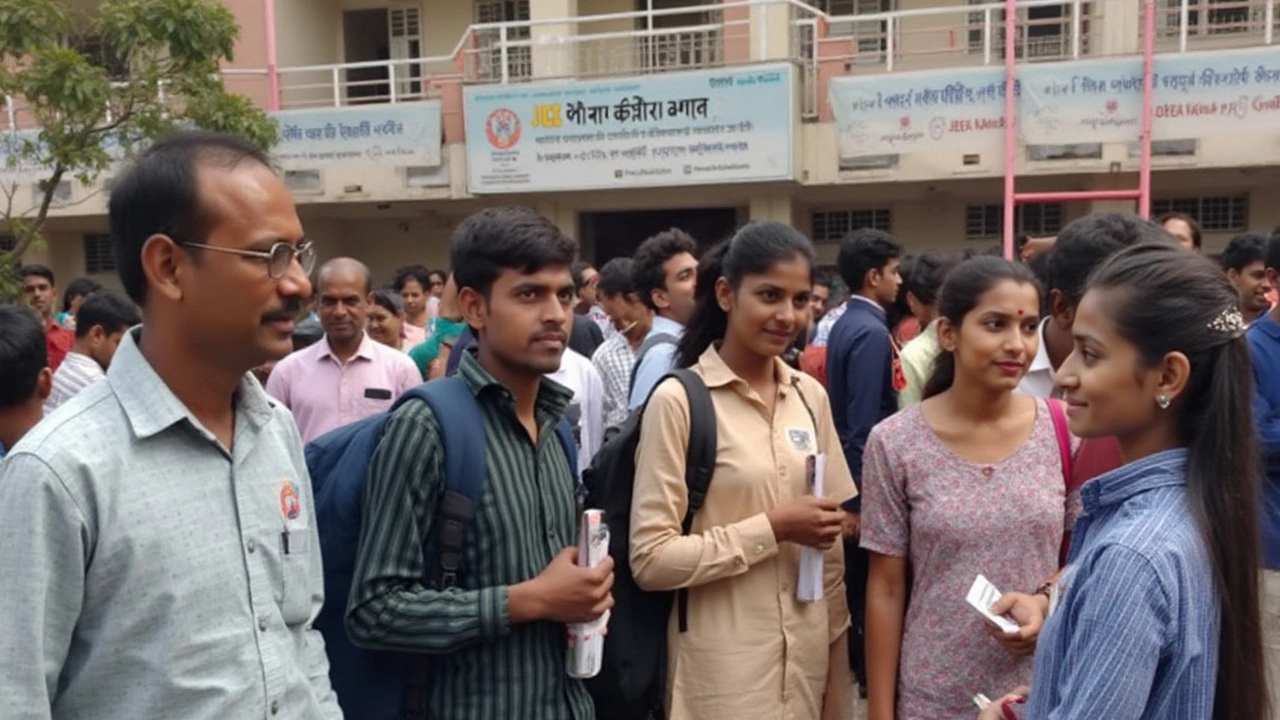If you're navigating the journey toward a seat at an IIT, understanding the different layers of the examination process is crucial. The journey begins with JEE Mains, a foundational step for students not just aiming for IIT, but for several other prestigious engineering institutes across India. However, don't mistake it for just a stepping-stone; it's a significant hurdle in its own right.
Where JEE Mains offers a hisghway to various institutions, JEE Advanced is like the road leading directly to the gates of IIT. Not everyone who takes the Mains makes it to the Advanced, as it is specifically designed to be more challenging, focusing on a deeper understanding of complexities in subjects like Mathematics, Physics, and Chemistry.
This article sheds light on the core distinctions between these two exams, helping students to not only prepare effectively but to strategically chart their course toward engineering success.
- Purpose and Scope
- Eligibility Criteria
- Exam Format and Structure
- Syllabus and Content
- Preparation Strategies
- Interesting Insights and Tips
Purpose and Scope
The distinction between JEE Mains and JEE Advanced lies significantly in their purpose and scope. Both exams share a common goal—selecting capable minds for engineering programs in India—but the extent of their reach and function differs. JEE Mains serves as a broad-based examination accessible to millions yearly, funneling them into prestigious national universities such as NITs, IIITs, and other centrally funded institutions. Aside from targeting the younger aspirants aiming to test their foundational understanding, JEE Mains is a mandatory qualification round for those targeting the coveted IITs.
The JEE Advanced, on the other hand, is the exclusive gateway to the Indian Institutes of Technology. It caters to those who have climbed past the Mains and are now at the helm of an opportunity to secure a place at one of the premier technology institutes in the world. The intensity and complexity of this exam necessitate a profound comprehension of science and mathematics concepts. While thousands attempt JEE Mains, only the top 2.5 lakh candidates earn the privilege to sit for JEE Advanced, reinforcing the idea of its exclusiveness and rigor.
Paul Paulerczyk from the renowned education journal once stated,
"JEE Advanced is more than a test; it is a crucible that molds the finest engineering minds with its demanding yet dignified structure."
It's important to understand that JEE Mains serves a dual purpose: not only does it qualify candidates for JEE Advanced, but it also stands as a solitary target for many who seek admission into other prestigious engineering schools across the country. In contrast, JEE Advanced remains focused with a singular mission: to filter and refine those who will enter the hallowed halls of an IIT.
A look at the data reveals the depth of these exams. For instance, in 2023, approximately 1.2 million candidates appeared for JEE Mains, yet only around 10% moved on to JEE Advanced, reflecting its selective nature. This stark contrast in numbers showcases the branching purpose and scope where Mains acts as both an introduction and elimination round.
Understanding these distinctions not only guides students in their preparation strategy but also in setting the right expectations for their engineering pursuit. A strategic approach, awareness of the scope, and a clear set of priorities are essential for navigating these exams successfully.
Eligibility Criteria
When you venture down the path toward the prestigious IITs, understanding the eligibility criteria of both JEE Mains and JEE Advanced becomes a cornerstone of your preparation strategy. Commencing with JEE Mains, it is open to all students who have completed or are in their final year of the class 12th examination. This examination welcomes a broad spectrum of aspirants since it's not restricted solely to future IIT candidates. Nevertheless, candidates must have studied Mathematics, Physics, and Chemistry as core subjects in their high school curriculum. A notable aspect of JEE Mains is its embrace of diversity, allowing candidates who have passed their 12th exams in prior years, ensuring that many can have a second chance at their dream.
JEE Advanced, on the other hand, presents a different kind of gatekeeping. Only those who rank among the top scorers of JEE Mains are eligible to sit for this more daunting challenge. Here, the elite circle narrows, limiting the pool of applicants based on performance not only on a national scale but also on regional quotas. Typically, around 2,50,000 candidates from JEE Mains are shortlisted for the Advanced, making the leap akin to walking on a tightrope where balance and precision are paramount. Another critical eligibility factor is age; candidates should be below a certain age limit, typically within five years of completing their 12th standard exams. Importantly, the JEE Advanced has age relaxations for certain categories, recognizing the diversity of applicants.
"The spirit of climbing the ladder of IIT requires more than just academic prerequisites; it demands resilience and strategic thinking," notes renowned educationist Dr. A. P. Singh.
Both exams also adhere to stringent nationality requirements. While foreign candidates can appear for these tests, specific conditions and separate quotas might apply. The number of attempts allowed tells a striking story of perseverance – candidates can attempt JEE Mains thrice and JEE Advanced twice. This reflects an understanding of the journey's grueling nature and offers students ample opportunity to fine-tune their strategies. The pressure to excel early on and secure a seat adds an additional layer of complexity for aspirants.
For those wondering about the application process, the National Testing Agency (NTA) conducts the JEE Mains and requires candidates to register online. Details must be meticulously entered, given the volume of applications, and any discrepancies can lead to application rejection. JEE Advanced follows a similar online registration, but distinct in its additional steps; successful Mains candidates receive a unique code allowing access to the Advanced application portal.
An often overlooked aspect is the financial investment required for these exams. Though fee structures vary based on nationality, gender, and category, concessions are often provided to various groups, ensuring that financial constraints don’t overshadow talent. Planning ahead, both financially and academically, becomes crucial to navigate through this pivotal stage of one's educational journey toward engineering excellence.

Exam Format and Structure
The JEE Mains and JEE Advanced exams serve distinct purposes and are structured accordingly to cater to their unique goals. JEE Mains acts as an initial qualifying test, not only for securing a place in prestigious NITs, IIITs, and other centrally funded technical institutions but also as a stepping stone to JEE Advanced, which specifically filters candidates for the IITs. The format for JEE Mains includes two papers. Paper 1 is for B.E./B.Tech courses, conducted in a Computer-Based Test mode, encompassing questions from Physics, Chemistry, and Mathematics. It's designed to test fundamental understanding and application skills in these subjects. Each question carries equal weight, and the exam encompasses multiple-choice questions (MCQs) as well as questions requiring numerical answers.
On the other hand, JEE Advanced is considered one of the toughest undergraduate admission tests in the world. Its format is crafted to dig deeper into a student's understanding of the subjects, comprising two mandatory papers in the same day, which test Physics, Chemistry, and Mathematics extensively. Unlike JEE Mains, the questions in JEE Advanced involve a mix of objective type, multiple correct options, matching type, and even matrix match questions, designed to evaluate analytical skills and conceptual clarity. This makes the exam more dynamic and challenging.
“The JEE Advanced doesn't only measure how much you know, but how well you can apply that knowledge,” observes Professor Hemant Dahiya, a noted educator in competitive exam preparation.
The Examination Environment
JEE Mains is held across multiple attempts throughout the year, offering students the flexibility to improve their scores; however, this necessitates consistent preparation. The table below provides a glimpse of the typical format over recent years:
| Paper | Mode | Subject | Questions | Marks |
|---|---|---|---|---|
| Mains Paper 1 | Online | PCM | 90 | 300 |
| Mains Paper 2 | Offline | Mathematics, Aptitude, Drawing | 82 | 400 |
This flexibility isn't afforded in the JEE Advanced, which is held once a year in a pen-and-paper mode, making every moment crucial. The unique nature of its question papers draws on logical reasoning and requires innovative problem-solving abilities, encouraging students to approach problems from various angles. Moreover, in JEE Advanced, partial marks are often awarded, motivating precision in answer selection and discouraging random guessing.
Navigating the JEE landscape means appreciating the nuanced differences in these exams; their formats and structures aren't merely bureaucratic details, but reflections of the skills and knowledge these exams aim to uncover. The intensity and rigor of JEE Advanced reflect the level of expertise expected at an IIT, guiding aspirants’ preparation strategies and shaping their study plans.
Syllabus and Content
Exploring the syllabus and content of JEE Mains and JEE Advanced reveals not just differences but also overlap, creating a complex mosaic that candidates need to navigate. The JEE Mains primarily focuses on the NCERT texts for Mathematics, Physics, and Chemistry of classes 11 and 12. It serves as a foundational ground, ensuring students have a good grasp of fundamental concepts that are crucial for any engineering course. These concepts, when mastered, act as building blocks for more advanced topics. This makes the exam accessible to a wider range of students who have undergone standard preparatory courses across various states of India.
On the other hand, JEE Advanced pushes the boundaries by digging deeper into these subjects, demanding not just recall but a thorough understanding and application of concepts. For instance, where JEE Mains might test a student’s knowledge of vectors and 3D geometry at a basic level, the Advanced exam will delve into complex interplays between linear algebra and vector algebra. This requires a student to think critically and use mathematical concepts in multi-layered ways. Physics in JEE Advanced often challenges students with problems that require understanding the nuances of frictionless environments or electromagnetic fields beyond what's typically covered in common textbooks.
Chemistry, too, takes a leap into in-depth analysis in JEE Advanced, with a strong emphasis on organic mechanisms, analytical reasoning in inorganic chemistry, and ability to manipulate various chemical equations swiftly. Candidates often must demonstrate their knowledge through unusual problem-solving methods, which can sometimes combine principles from different topics. The syllabus itself doesn’t stray far from the ones found in many high school curricula globally, but the way these topics are explored is notably more intense. This emphasis on advanced problem-solving skills is reflected in the exam's format. According to a report from IIT, about 20% of students find Chemistry in Advanced to be particularly challenging due to its broad and integrative questions.
Useful Tips for Navigating the Syllabus
A useful approach for mastering this expanded syllabus is to break down preparation into manageable segments. Allocate time to reinforce foundational knowledge through the NCERT books for JEE Mains, while simultaneously engaging with Advanced-level problems sourced from extra reading materials or coaching modules. Consistency and discipline can greatly enhance your understanding. Utilizing diverse resources like previous years' papers and attempting interdisciplinary problems will be vital too.
According to one IIT alumnus, "Success in JEE Advanced isn’t just about knowing more; it’s about connecting dots across contexts most can’t comprehend." This thinking has helped many aspirants unlock new ways to approach tricky problems, often creating their own pathways to the solution.
Being aware of which concepts are more heavily weighted can also guide your study sessions. For example, students should know that topics like Thermodynamics could reappear in problems mixed with Chemical Equilibriums or Electrochemistry. Additionally, keeping a keen eye on the updated syllabus released each year by the IIT council is essential, as occasional changes do occur, impacting preparation strategies. Staying informed and adaptable will likely provide a significant edge.

Preparation Strategies
Preparing for both JEE Mains and JEE Advanced requires a unique blend of discipline, strategic planning, and an in-depth understanding of each exam's demands. While both assessments test your grasp on science and mathematics, they do so in slightly different ways. A successful preparation plan should start with setting clear goals. It's not just about passing, it’s about excelling. Knowing how much time you have until the exams and dividing that time effectively among the subjects is crucial.
One effective way to start is by analyzing past years’ papers. Not only does this familiarize you with the type of questions asked, but it also helps in identifying the weightage of different topics, allowing you to prioritize your study schedule accordingly. Ample practice through mock tests and sample questions is key. It’s often stated that, “Practice doesn't make perfect; practice makes permanent.” This underscores the need to not just practice, but practice correctly.
Diving into the subjects, it’s essential to have a strong foundation in the basics before attempting complex problems. For instance, physics fundamentals must be rock solid to tackle mechanics and thermodynamics in the Advanced paper. Chemistry entails memorization, but a deep understanding of organic reactions is crucial. Mathematics demands a dual focus on speed and precision, especially in calculus and algebra. Regular revisions through concise notes made during study sessions can help reinforce this knowledge over time.
Health matters too, and it's something many aspirants overlook. Managing stress and keeping a healthy routine can significantly positively influence your performance. Incorporate breaks and maintain a fitness or meditation routine. A balanced diet, adequate sleep, and mental relaxation play crucial roles in keeping your mind sharp and ready. As the famous educator John Dewey once said,
“Education is not preparation for life; education is life itself.”This reminds us that education extends beyond textbooks and tests; it’s about creating a lifestyle of continuous learning.
Another strategy is forming or joining a study group. This provides you with the opportunity to discuss difficult topics, ask questions, and teach others—each activity solidifies your understanding and can provide new insights you might not have considered alone. Also, take advantage of online resources—there are many platforms offering free or affordable lessons and practice questions tailored to both these exams. Be mindful, though, to rely on respected and proven sources rather than lesser-known platforms.
Interesting Insights and Tips
Delving into the depths of the JEE Mains and JEE Advanced, one cannot ignore the stark psychological dynamics playing out in a student’s preparation journey. While preparation is often grueling, what sets apart successful candidates is their approach to balancing hard work with smart strategies. One interesting insight is the role of mental conditioning in high-pressure exams. Those who succeed often view the exam not just as an academic challenge, but as a mental game.
One of the often-shared tips from toppers includes starting early, but more importantly, starting right. While both exams cover similar subjects, the depth of understanding required for JEE Advanced is significantly greater. This necessitates a different approach altogether. Students are encouraged to maintain a healthy balance between studying and recreating. Regular intervals of relaxation, as some experts suggest, are just as important as the hours spent toiling over textbooks.
A practical tip is utilizing online mock tests that closely simulate the actual exam environment. By regularly taking these tests, students can familiarize themselves with time constraints and question formats, which can significantly reduce exam-day anxieties. Consider using varied resources like video lectures, interactive quizzes, and group discussions to break the monotony of traditional study methods.
"Success is not the result of spontaneous combustion. You must set yourself on fire." – Arnold H. Glasow
Also, maintaining consistency in preparation is vital. Students should devise a schedule that aligns with their productivity peaks. Early risers might find studying complex topics like Physics more effective in the morning, while night owls may tackle Mathematics with fresher perspectives post-dusk. Remember that effective preparation is more a marathon than a sprint.
JEE Mains is often a numbers game, with a vast number of aspirants competing. In contrast, JEE Advanced requires one to think beyond standard solutions. An interesting fact is that many JEE toppers often find problem-solving akin to puzzle-solving, where creativity plays a crucial role. Interviews with past successful candidates reveal that approaching problems from unconventional angles sometimes provides shortcuts and deeper understanding.
| Aspiration | Estimated Percentage of Success |
|---|---|
| JEE Mains | Top 10% Applicants |
| JEE Advanced | Top 2% Qualifiers |
Remember, the journey to excelling in these exams not only opens doors to an engineering future but also builds resilience and problem-solving skills that are invaluable. Equipping oneself with the right mindset and tools is crucial. While the path is challenging, the rewards, both in knowledge and opportunities, make every sacrifice worthwhile. Stay curious, stay driven, and most importantly, enjoy the learning process.





Write a comment